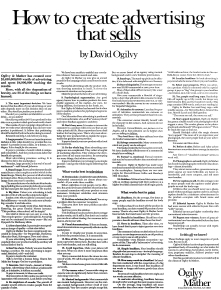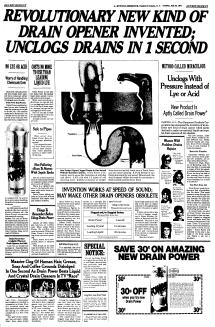

What is an advertorial?
Straightforwardly, the word advertorial is the combination of the words advertisement plus editorial.
Here’s the skinny. People are used to reading editorials and often averse to reading ads, so if you format your ad to look like valuable editorial content, you’ve instantly gained credibility with your audience and will get a bump in readership.
20th Century advertising legend John Caples (and later his greatest disciple David Ogilvy) was the first to advocate and rigorously test the advertorial format.
One of his earliest split-run tests, in which one version of an ad was formatted as a traditional ad and the other as an advertorial resulted in the advertorial format getting 81% more orders.
The ad copy was the exactly same in each ad — from the headline to the order form.
This is not to say that an advertorial will always outpull a traditional print ad — testing is ths only way to determine which is optimum for any given product or service.
The advertorial up top, How to create advertising that sells was written by David Ogilvy and Joel Raphaelson. The ad could just as easily have a picture of Ogilvy in his office smoking a pipe, (like on the cover of his mandatory book Ogilvy On Advertising) and a list of the agency’s stellar clients.
Instead, it’s a behemoth 1,909 words long. (You can click on the image to download a PDF of the ad).
As Ogilvy says, the purpose of this ad — and the others in the series — was to project the agency as knowing more about advertising than anyone else. This advertorial promises and delivers useful information.
The second advertorial, Revolutionary New Kind of Drain Opener Invented; Unclogs Drains in One Second is a textbook advertorial.
Notice that this ad has a coupon solely for the purpose of pushing retail sales.
Thanks Lawrence,
Your blog is brilliant in a sea of drivel.
We’ve been experimenting with advertorial style ads for newspapers with varied success, the main challenge has been getting the ads passed, it seems that the some of the UK press has taken a dislike to them currently.
I’ll try some of the ideas presented here though 🙂
Neil Asher
Of course the online version would be flogs (fake blogs) and fake news sites, which seem to be performing like crazy but are now very hard to use due to recent FTC regulation.
This is a superb blog Lawrence!
(Why has it taken me so long to find it?)
I love reading about the old writers, their ads and ideas, especially when you can use so much of the information today. This stuff is so inspiring and just what I need when my imagination won’t come up with anything useful – seems to have happened a lot lately.
Keep up the good work and I’ll be checking in here regularly.
Ben Vaughan.